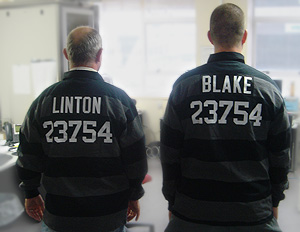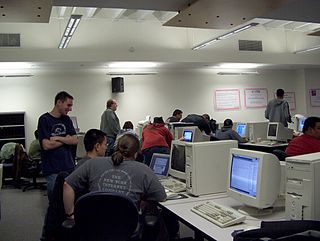
The Internet is the global system of interconnected computer networks that uses the Internet protocol suite (TCP/IP) to communicate between networks and devices. It is a network of networks that consists of private, public, academic, business, and government networks of local to global scope, linked by a broad array of electronic, wireless, and optical networking technologies. The Internet carries a vast range of information resources and services, such as the interlinked hypertext documents and applications of the World Wide Web (WWW), electronic mail, telephony, and file sharing.

Internet Relay Chat (IRC) is a text-based chat system for instant messaging. IRC is designed for group communication in discussion forums, called channels, but also allows one-on-one communication via private messages as well as chat and data transfer, including file sharing.

The SANS Institute is a private U.S. for-profit company founded in 1989 that specializes in information security, cybersecurity training, and selling certificates. Topics available for training include cyber and network defenses, penetration testing, incident response, digital forensics, and auditing. The information security courses are developed through a consensus process involving administrators, security managers, and information security professionals. The courses cover security fundamentals and technical aspects of information security. The institute has been recognized for its training programs and certification programs. Per 2021, SANS is the world’s largest cybersecurity research and training organization. SANS is an acronym for SysAdmin, Audit, Network, and Security.
An online community, also called an internet community or web community, is a community whose members interact with each other primarily via the Internet. Members of the community usually share common interests. For many, online communities may feel like home, consisting of a "family of invisible friends". Additionally, these "friends" can be connected through gaming communities and gaming companies. Those who wish to be a part of an online community usually have to become a member via a specific site and thereby gain access to specific content or links.
The North American Network Operators' Group (NANOG) is an educational and operational forum for the coordination and dissemination of technical information related to backbone/enterprise networking technologies and operational practices. It runs meetings, talks, surveys, and an influential mailing list for Internet service providers. The main method of communication is the NANOG mailing list, a free mailing list to which anyone may subscribe or post.
A LAN party is a social gathering of participants with personal computers or compatible game consoles, where a local area network (LAN) connection is established between the devices using a router or switch, primarily for the purpose of playing multiplayer video games together. LAN party events differ significantly from LAN gaming centers and Internet cafes in that LAN parties generally require participants to bring your own computer (BYOC) and are not permanent installations, often taking place in general-use venues or residences.

Internet culture is a quasi-underground culture developed and maintained among frequent and active users of the Internet who primarily communicate with one another online as members of online communities; that is, a culture whose influence is "mediated by computer screens" and information communication technology, specifically the Internet.
Station identification is the practice of radio and television stations and networks identifying themselves on-air, typically by means of a call sign or brand name. This may be to satisfy requirements of licensing authorities, a form of branding, or a combination of both. As such, it is closely related to production logos, used in television and cinema alike.
"First Friday" is a name for various public events in some cities that occur on the first Friday of every month.

The INOC-DBA hotline phone system is a global voice telephony network that connects the network operations centers and security incident response teams of critical Internet infrastructure providers such as backbone carriers, Internet service providers, and Internet exchanges as well as critical individuals within the policy, regulatory, Internet governance, security and vendor communities. It was built by Packet Clearing House in 2001, was publicly announced at NANOG in October 2002, and the secretariat function was transferred from PCH to the Brazilian CERT in 2015.
Zattoo is a TV platform which states that it can be used for IP-based transmission of television channels and video on demand content to different devices. The company headquarters are located in Zurich and it has an additional office in Berlin.

Wikivoyage is a free web-based travel guide for travel destinations and travel topics written by volunteer authors. It is a sister project of Wikipedia and supported and hosted by the same non-profit Wikimedia Foundation (WMF). Wikivoyage has been called the "Wikipedia of travel guides".

Odnoklassniki, abbreviated as OK or OK.ru, is a social network service used mainly in Russia and former Soviet Republics. The site was launched on March 4, 2006 by Albert Popkov and is currently owned by VK.
Internet network operators' groups (NOGs) are informal, country-based, or regional groups that exist to provide forums for Internet network operators to discuss matters of mutual interest, usually through a combination of mailing lists and annual conferences. Although these groups have no formal power, their members are typically influential members of the Internet service provider (ISP), Internet exchange point (IXP), regional Internet registry (RIR), operational security community, Internet Protocol version 6 (IPv6) operations, Domain Name System (DNS) and root zone operations, and other network operations communities, and discussions within these groups are often influential in the overall process of ensuring the Internet remains operational, robust, secure, and stable. They also allow networking professionals and other members of the research and technical communities to update each other on their work, share news and updates, exchange best practices, discuss new technologies or protocols, teach and learn from each other, network with other members of the community, and discuss current network- and Internet-related issues and challenges.
SWI swissinfo.ch is a multilingual international news and information company based in Bern Switzerland. It is a part of the Swiss Broadcasting Corporation. Its content is Swiss-centred, with top priority given to in-depth information on politics, the economy, the arts, science, education, and direct democracy. Switzerland's international political, economic and cultural relations are other key points of focus. The website is available in ten languages.

UPC was the largest cable operator in Switzerland with around 1.1 million residential and business customers and was formed in 1994 through the merger of several cable operators. UPC has been a subsidiary of Liberty Global from 2005 until its discontinuation in 2022.

A Linux User Group or Linux Users' Group (LUG) or GNU/Linux User Group (GLUG) is a private, generally non-profit or not-for-profit organization that provides support and/or education for Linux users, particularly for inexperienced users. The term commonly refers to local groups that meet in person but is also used to refer to online support groups that may have members spread over a very wide area and that do not organize, or are not dependent on, physical meetings. Many LUGs encompass FreeBSD and other free-software / open source Unix-based operating systems.

Merit Network, Inc., is a nonprofit member-governed organization providing high-performance computer networking and related services to educational, government, health care, and nonprofit organizations, primarily in Michigan. Created in 1966, Merit operates the longest running regional computer network in the United States.

The terms internet tribe or digital tribe are used as slang terms for unofficial online communities or organizations of people who share a common interest, and who are usually loosely affiliated with each other through social media or other Internet routes. The term is related to "tribe", which traditionally refers to people closely associated in both geography and genealogy. Nowadays, it looks more like a virtual community or a personal network and it is often called global digital tribe. Most anthropologists agree that a tribe is a (small) society that practices its own customs and culture, and that these define the tribe. The tribes are divided into clans, with their own customs and cultural values that differentiate them from activities that occur in 'real life' contexts. People feel more inclined to share and defend their ideas on social networks than they would face to face.

Bevil Wooding is a Trinidadian technologist and development strategist who is the Chief Knowledge Officer at Congress WBN, a UK-registered charity with operations in over 120 countries. He is known for his work in the field of Information and Communications Technology (ICT) in the Caribbean. In 2010, he was named by ICANN as one of the Trusted Community Representatives for the Domain Name System Security Extensions (DNSSEC) root. Wooding advocates for developing states and emerging economies to create policies, build infrastructure, and leverage human resource capacity for technology-enabled development. He has been described as "a visionary who believes that the Caribbean Economy can be enhanced through ICTs and Internet development.”










